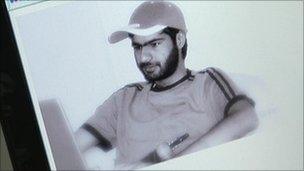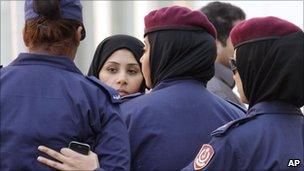Bahrain blogger 'tortured' in jail with Shia opposition
- Published
Bahraini Blogger's wife on her detained husband
"He's a writer, he's a journalist, he's a blogger. Ali does not belong to any political party. He just writes his opinion."
Jenan Al Oraibi's dark eyes flash beneath her black hijab. She is speaking of her husband Ali Abdulemam, known as the Bahraini Blogger, external.
We are talking in the home of her friends in a village close to Manama, the capital city of this Gulf island kingdom, which projects itself as an Arab state that is open to investment, progressive about change and moving confidently toward democracy.
"Ali has a free pen. That is exactly his crime. He has a free pen," she says bluntly.
Ali Abdulemam is 32 years old. He worked as an IT specialist for the Bahraini airline Gulf Air. In his spare time he blogged.
But he was sacked from the airline after he was arrested in September and accused of being part of a terror organisation.
He was charged with spreading false information and linked to a group of Bahraini oppositionists who had been arrested in August.
Terror charge
All of the men charged are Shia. Some are academics, one is a dentist, another a geologist, several are clerics.

Ali Abdulemam blogged in his spare time
Like Mr Abdulemam, they have frequently voiced their criticism of a government they consider undemocratic and discriminatory toward Shia, who are Bahrain's majority population.
The ruling Al Khalifa family are Sunni Muslims.
The men were initially charged with plotting the overthrow of the government, but the charges were subsequently reduced to financing and leading a terror cell.
It's not the first time that Ali Abdulemam has been in trouble with the government because of his blog. In 2005 he was briefly jailed.
On his release he continued his criticism of the Al Khalifa government on issues like the detention of opposition leaders, the treatment of prisoners in jail and the suppression of free speech.
But nothing prepared his wife Jenan for what happened on 4 September.
"He got a phone call from the public prosecutor's office, asking him for a meeting. So he went." And that, she says, is the last she saw or heard from her husband for four weeks.
"We were not able to know anything about Ali, no phone calls, nothing."
For several weeks after his arrest Mr Abdulemam, like the others, was denied access to lawyers and to his family.
His final blog before he was taken into custody, external was a call to support the detainees.
"The last thing he wrote was for those prisoners, defending them and now he is one of them," his wife says.
"The 23 detainees are all victims. They are all good people who have good jobs in this society. They are all innocent. My husband is innocent.
"They warned them, 'if you speak of any mistreatment, any torture, we will torture you even more'. But they are really brave, they are heroes, they decided to stand up and say exactly what happened to them."
'No mistreatment'
At the first hearing on 28 October, most of the defendants alleged that they were tortured in order to extract confessions, a charge the authorities deny.
In a written response to a request from the BBC to comment on the allegations, the government stated: "Standard procedures are applied fairly to all detainees in custody in line with the law. Their rights are being protected and no mistreatment has occurred."
Saeed Boumedouha of Amnesty International attended the first hearing as an observer, and confirms that when given the opportunity to speak, most of the defendants said they were tortured.
"Amnesty International remains very concerned about these allegations and we are continuing to press for an independent investigation," Mr Boumedouha said.

A relative of one defendant refused to move away from the courthouse area and was later arrested
Jenan is the mother of nine-month-old twin girls and a five-year-old boy. Since her husband lost his job, she is the breadwinner. But she feels under threat too.
"During his interrogation, they threatened my husband that I would lose my job as well," she says.
When we visited her we were closely followed by plain clothed security officers in unmarked cars.
I asked her if she was concerned about repercussions because she had agreed to talk to the BBC.
"Definitely I am worried," she said. "I am worried for my children. I am worried for myself. But I will be more worried if I don't do anything."
The next hearing in the trial is set for 23 December.
Crossing Continents is on BBC Radio 4 on Thursday 16 December at 1100 GMT and Monday 20 December at 2030 GMT. You can also listen via the iPlayer or download the podcast.
- Published28 October 2010
- Published8 September 2010
- Published5 September 2010
- Published15 August 2010